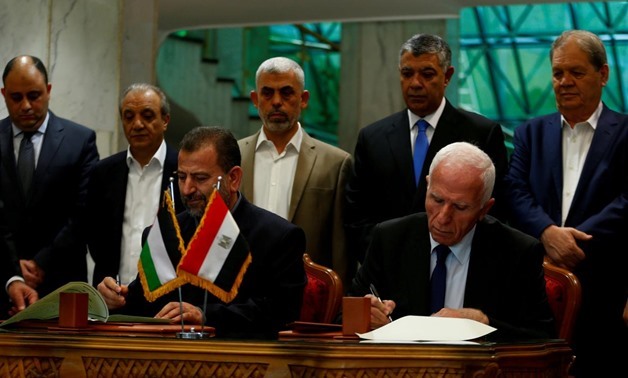
Head of Hamas delegation Saleh Arouri and Fatah leader Azzam Ahmad sign a reconciliation deal in Cairo, Egypt, October 12, 2017. REUTERS- Amr Abdallah Dalsh
CAIRO – 16 October 2017: As the majority of foreign governments widely welcomed the Palestinian reconciliation between Fatah and Hamas, Israel’s government seems to have another opinion, which raises questions about the party undermining all peace attempts to end the decade-long conflict.
Israeli Prime Minister Benjamin Netanyahu preferred to follow the “wait and see” strategy since the beginning of the reconciliation, which was strongly condemned by several ministers of his government including Minister of Education Naftali Bennett.
Bennett demanded that the PM cut all diplomatic relations with the Palestinian authorities once a deal between Fatah and Hamas was announced. He also called on the Israeli government to refrain from giving the Palestinian authorities the taxes that Israel collects on their behalf, Sputnik reported on October 3. Bennett added that his call was not basically because of the reconciliation itself, but was because “the Palestinian president is cooperating now with an organization labeled as ‘terrorist’.”
Moreover, in a statement released October 3, Netanyahu broke his silence and put three conditions for accepting and recognizing the reconciliation between the Palestinian parties.
These conditions include, the “dissolution of the military wing of Hamas, cutting all diplomatic relations with Iran, and recognizing Israel as a state.” “We will not accept any false reconciliation based over our interests,” Netanyahu said in his statement.
On the other hand, the Palestinian authorities blocked all attempts from Israel's side in interfering in the reconciliation. “Palestinians will not accept any Israeli attempts to interfere in their internal affairs,” Foreign Minister Riad al-Malki said in statements Sunday.
He added that the reconciliation between Fatah and Hamas will continue as agreed. “We heard about the Israeli conditions [that were put as prerequisites] to recognize our reconciliation; however, we will continue with our plan as it is,” Malki added.
Who welcomed the reconciliation?
Most foreign governments widely welcomed the reconciliation between Fatah and Hamas, including France, the United States, China and Oman.
In an official statement, the French Foreign Ministry has lauded the role of the Egyptian authorities to conclude that the deal will "enable the Palestinian Authority to practice full powers in the Gaza Strip."
The U.S. State Department also hailed efforts exerted by the Palestinian Authority to assume its full responsibilities in the Gaza Strip after the Palestinian rivals (Fatah and Hamas) signed the reconciliation accord in Cairo.
"We see that as a potentially important step into getting humanitarian aid in to the people who live there," State Department spokesperson Heather Nauert said according to Al-Hurra channel.
Nauert added that the U.S. is going to watch those developments very closely.
China also welcomed the reconciliation deal signed, expressing appreciation for Egypt's efforts in promoting Palestinian unity.
The Chinese officially voiced confidence that ending the division and accomplishing the Egypt-brokered reconciliation will lead to resuming the Palestinian-Israeli peace talks, achieving Palestine's independence, and reaching peaceful coexistence between the two countries.
The Omani Foreign Ministry also said in an official statement that Muscat welcomed the final reconciliation agreement between the Palestinian factions which would unify the Palestinian ranks, end the division, and support national unity in obtaining all its legitimate rights. The reconciliation will aid the establishment of the Palestinian State on the borders of June 4, 1967 with Al-Quds as its capital.
Thursday, October 12, Hamas and Fatah, announced signing the final deal in Cairo regarding the reconciliation, officially ending the decade-long national split.
Last week, Palestinian Prime Minister of the National Consensus Government formed in 2014, Rami Hamdallah, held his first cabinet meeting in Gaza after Hamas announced handing over the administration of the Gaza Strip to the unity government; a major step towards Palestinian reconciliation.
The West Bank and the Gaza Strip remained politically and administratively divided since June 2007, when Hamas took over the Gaza Strip following days of street fighting.


Comments
Leave a Comment